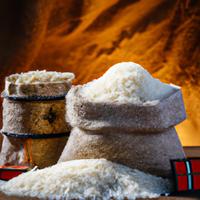
1 serving (100 grams) contains 121 calories, 3.5 grams of protein, 0.4 grams of fat, and 25.2 grams of carbohydrates.

Log this food in SnapCalorie

Nutrition Information
Calories |
242 | ||
|---|---|---|---|
% Daily Value* |
|||
| Total Fat | 0.8 g | 1% | |
| Saturated Fat | 0.2 g | 1% | |
| Polyunsaturated Fat | 0 g | ||
| Cholesterol | 0 mg | 0% | |
| Sodium | 0 mg | 0% | |
| Total Carbohydrates | 50.4 g | 18% | |
| Dietary Fiber | 0.8 g | 2% | |
| Sugars | 0.2 g | ||
| protein | 7 g | 14% | |
| Vitamin D | 0 mcg | 0% | |
| Calcium | 20 mg | 1% | |
| Iron | 0.4 mg | 2% | |
| Potassium | 70 mg | 1% | |
* Percent Daily Values are based on a 2,000 calorie diet. Your daily values may be higher or lower depending on your calorie needs.
Food Attributes
Source of Calories
About Basmati rice in bags
Basmati rice, renowned for its fragrant aroma and long, slender grains, is a staple in South Asian cuisine, particularly Indian and Pakistani dishes. Naturally gluten-free, this rice variety is rich in carbohydrates, making it an excellent source of energy. It contains less arsenic compared to other rice types and supports digestive health due to its lower glycemic index, which helps regulate blood sugar levels. Basmati rice is often packaged in airtight bags to maintain its freshness and preserve its delicate flavor. While it is low in fat and cholesterol-free, moderation is key, as it is primarily a carbohydrate source. Available in white and brown varieties, the brown version offers higher fiber content and additional nutrients. Perfect for pilafs, biryanis, or steamed alongside curries, Basmati rice’s versatility and health benefits make it a premium choice for wholesome, balanced meals.



